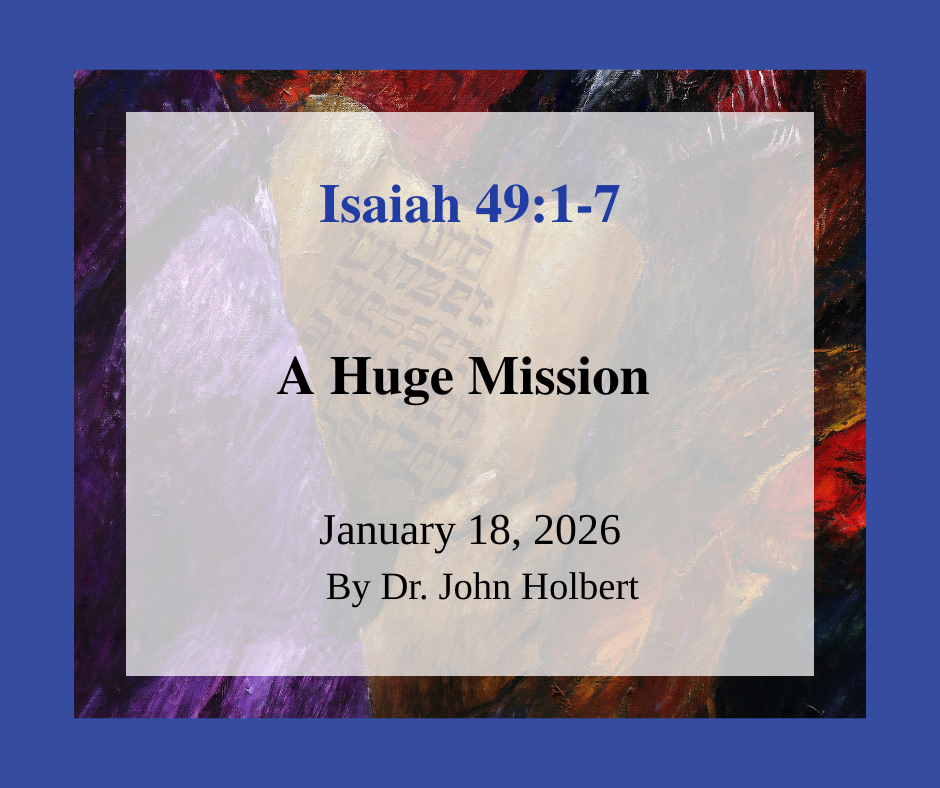A Huge Mission - Reflections on Isaiah 49:1-7, Second Sunday after Epiphany, Year A
by John C. Holbert on Friday, November 14, 2025

Today’s text brings us to the second of the four Servant Songs of 2-Isaiah. Last week, we examined the first of the songs in Is.42, and later in the liturgical year, particularly close to Easter, we will have a look at the other two from chapters 50 and 52-53. These remarkable, and somewhat enigmatic poems, played a huge role in the early church’s attempt to evaluate and understand who Jesus was and what his work in the world more exactly was. Is.49 continues that important task for Christians, while it also speaks crucially to the Judean exiles, those struggling to survive and thrive in the great city, Babylon, and to the portion of the exiles who have chosen to return to Jerusalem under the gift of freedom offered by Cyrus the Persian, after his assumption of power over the former Babylonian empire.
The mysterious servant of YHWH, who both speaks and is spoken of in this song, is directly called “Israel” (Is.49:3). However, it is the only time in any of the four servant songs that the servant is named so specifically. In addition, the Greek version of this text in the Septuagint (LXX) omits the word in its translation. In my last essay on the first song (see Jan. 11, 2026), I suggested that the servant may be a portion of the exiles in Babylon, hardly all of them, a designated group whose role in YHWH’s world was significant, most especially as bringers of justice, that is equity leading to shalom (Is.42:1,3,4). In this second song that mission will be vastly increased to include all nations, not merely the restored nation of Judah.
“Listen to me, coastlands;
Pay attention, peoples far away” (Is.49:1)
The servant speaks first, and demands the attention of a huge audience that includes the “coastlands,” a group that encompasses perhaps all the many lands that possess coasts, from the islands of the Mediterranean Sea to the coasts of Israel and Judah and Egypt, any who live “far away.” Then the servant adds the divine origin of its work from YHWH.
“YHWH called me from the belly,
from my mother’s womb YHWH named me,
and made my mouth a sharp sword.” (Is.49:1-2)
Recalling a similar call from Jeremiah 1:5, the servant claims that its ministry was begun even before its birth, thus giving it a prenatal power, a certainty of purpose before birth. Its name was to be “servant, in whom I YHWH will be glorified” (Is.49:3). However, the servant, like many prophets before it, was at first reluctant and fearful in the face of the call of YHWH: “I have labored in vain, spent my strength for nothing, for emptiness” (Is.49:4a). The early work of the servant seemed useless, without success. Still, “my justice is found in YHWH, my reward with my God” (Is.49:4b). Like the servant of Is.42, here the servant, though at first defeated, retains the conviction that YHWH continues to be the mainstay and support of the servant’s search for justice.
But now YHWH radically expands the work that the servant is called to do in one of the scripture’s more breathtaking announcements.
“It is too trivial a thing that you should be my servant
to lift up the tribes of Jacob,
to restore the survivors of Israel;
I now make you a light to the nations,
in order that my salvation may reach the ends of the earth!” (Is.49:6)
The role of the servant is now to be nothing less than all nations’ light in order that the light of salvation may reach into every corner of the earth. Little wonder that early Christians found in these words the universal certainty that Jesus Messiah had come not merely for a small band of followers, but had appeared on the earth as God’s agent, God’s servant, to bring the hope of God’s light to the whole world. And for Isaiah’s community as servant, their task was to be such models of YHWH’s justice as to enlighten the entire world that YHWH had made, leading it toward shalom. Whether one is Jew or Christian, the call to the servant of God is to touch the entire world with God’s light and hope. Indeed, “kings will arise and see, and princes will prostrate themselves” before this servant (Is.49:7), indicating that the rule of God will one day cover the whole earth. This is both Isaiah’s promise for his time and, in the light of Jesus’ birth, God’s Christian promise as well. It is a huge mission that we are given, one that must consume us as God’s servants to the entire cosmos.
